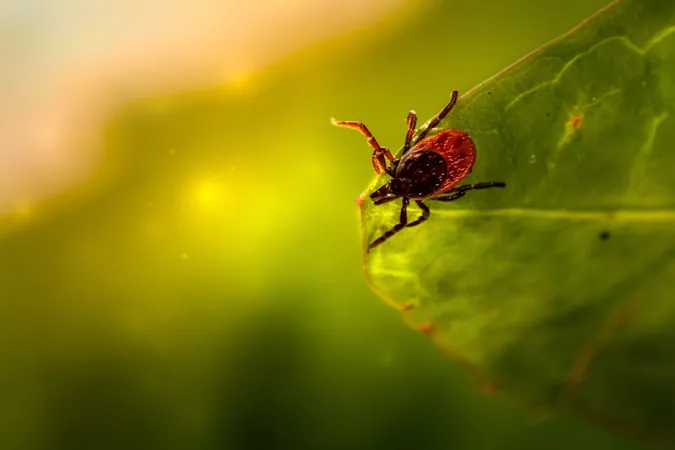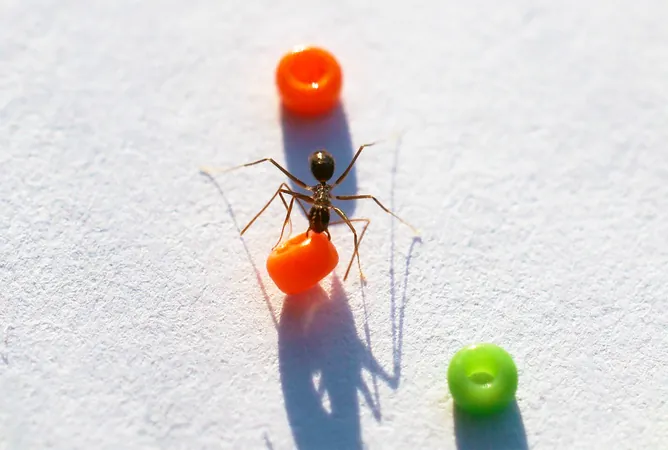
Beware! Tick Season Has Arrived on the Sunshine Coast—What You Need to Know
2025-05-12
Author: Olivia
Tick Season Is Here!
The Sunshine Coast is bracing itself for tick season, and according to Dr. Mayank Singal, a specialist at the BC Centre for Disease Control (BCCDC), there's a critical piece of information every outdoor enthusiast should know: only 1% of ticks in British Columbia carry Lyme disease. But don't let your guard down! This statistic contrasts starkly with regions like Ontario and Quebec, where up to 40% of ticks can be dangerous.
"Ticks are ubiquitous throughout the province, and the Sunshine Coast, thanks to its milder climate, sees plenty of these pests," Dr. Singal warns. In fact, the tick season kicks off earlier here compared to other areas, with sightings happening year-round, even in winter. Just last January, he encountered a tick on a patient!
Understanding Ticks and Their Risks
According to the BCCDC, ticks are tiny creatures found in grass, bushes, and forests. The peak tick season on the Sunshine Coast spans from March to October. With outdoor activities ramping up due to the pleasant weather, it's essential to remain vigilant. Lyme disease is the main concern, often transmitted by Ixodes ticks, primarily located in southwestern BC.
The BCCDC notes that while Lyme disease cases have remained stable from 2013 to 2022, with annual reports ranging from 6 to 39 cases, most infections were linked to travel outside the province. Local cases vary between 1 and 14 annually. Other diseases like anaplasmosis and babesiosis are also affiliated with ticks but haven’t manifested in humans yet, though climate change could change that.
Tick Prevention Tips You Can't Ignore!
Preparation is key for tick prevention. Dr. Singal recommends three crucial steps before heading outdoors. First, dress appropriately—wear loose, light-colored clothing that covers arms and legs. Then, apply insect repellent with DEET or Icaridin to your exposed skin and clothes.
While enjoying nature, keep your distance from dense foliage where ticks love to lurk. Upon returning home, perform a thorough tick check on yourself, your family, and even your pets, paying close attention to areas like the scalp, armpits, and groin.
What to Do If You Find a Tick
If you discover a tick, it's crucial to act swiftly. Use tweezers to grip the tick as close to the skin as possible and pull straight out to avoid leaving any parts behind. After removal, wash the area with soap and disinfect. Be sure not to touch the tick with bare hands! Take a photo to identify it later through eTick.ca, and store the tick in a container in the freezer for potential testing.
Stay alert for any symptoms like fever or rash in the following weeks, and consult a healthcare provider if you feel unwell.
Your Pets Are at Risk, Too!
It’s not just humans who should watch out. Dogs, horses, and other animals can also contract Lyme disease, often showing symptoms akin to humans. Dogs are particularly at risk, with symptoms sometimes delaying for weeks after a tick bite.
If you find a tick on your furry friend, remove it just as you would for a human and consult your veterinarian about effective tick prevention options.
With these precautions in mind, enjoy the great outdoors safely this tick season!









 Brasil (PT)
Brasil (PT)
 Canada (EN)
Canada (EN)
 Chile (ES)
Chile (ES)
 Česko (CS)
Česko (CS)
 대한민국 (KO)
대한민국 (KO)
 España (ES)
España (ES)
 France (FR)
France (FR)
 Hong Kong (EN)
Hong Kong (EN)
 Italia (IT)
Italia (IT)
 日本 (JA)
日本 (JA)
 Magyarország (HU)
Magyarország (HU)
 Norge (NO)
Norge (NO)
 Polska (PL)
Polska (PL)
 Schweiz (DE)
Schweiz (DE)
 Singapore (EN)
Singapore (EN)
 Sverige (SV)
Sverige (SV)
 Suomi (FI)
Suomi (FI)
 Türkiye (TR)
Türkiye (TR)
 الإمارات العربية المتحدة (AR)
الإمارات العربية المتحدة (AR)